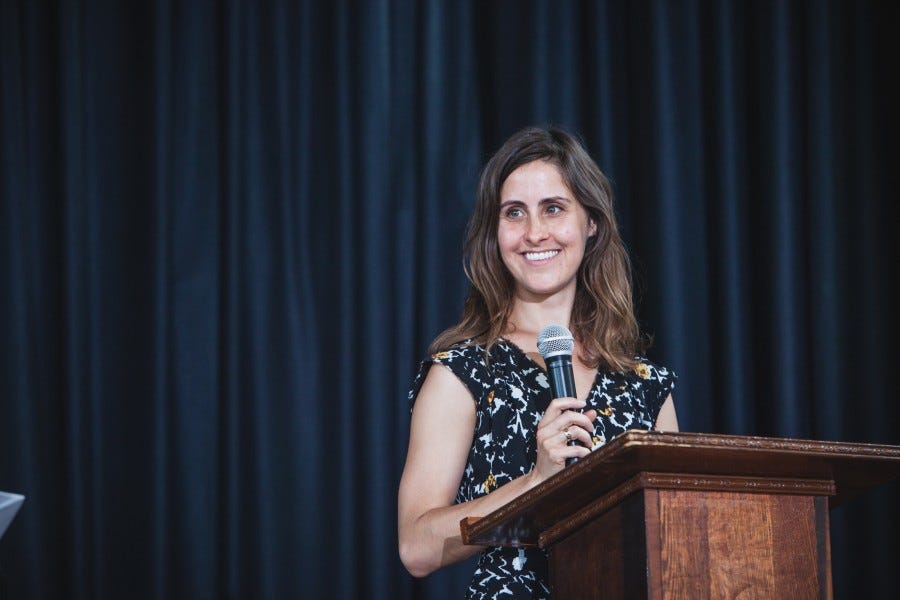'The Ongoing Childcare Crisis Remains a Huge Barrier for Women in the Workplace'
Danae McLeod, CEO of Grace Institute, on how her organization is helping unemployed and underemployed women to build thriving careers.
I was as in London last week and had the great pleasure of doing a series of book talks in a city that will always feel a little bit like home. It was wonderful and extremely busy and I didn’t have time to write much.
Instead, today I’m sharing an interview that I recently did with Danae McLeod, the chief executive officer of Grace Institute, a remarkable organization based in lower Manhattan dedicated to women’s economic empowerment. It equips unemployed and underemployed women with the skills, knowledge and confidence to land, in many cases, life-changing career opportunities.
I had the pleasure of visiting Grace Institute for an event in March, during which I spoke to members of staff, women in the program, alumnae, sponsors and supporters about my learnings from the book. I was in awe of the work the organization does to assist women in realizing and recognizing their own economic and professional potential.
Thank you so much for taking the time to talk to me, Danae. Can you start by telling me a little bit about the Grace Institute. What’s its history and its mission?
Grace Institute is a workforce training nonprofit in New York City that is 127 years old—it was started in 1897 by W.R. Grace, a shipping magnate and Irish immigrant who wanted to give back to his community.
His largely Irish workforce told him that their wives, daughters, and mothers needed jobs so he worked with Grace Dodge (who later went on to form the YWCA) and his brother, Michael to create a workforce training program for immigrant women.
At our site in downtown Manhattan we have a lovely photo of the training that Grace Institute offered women—at the time it was domestic oriented (cooking, housekeeping, childcare.). The through line of our work is that we have continued training unemployed and underemployed women throughout the decades in the types of jobs that do not require a college degree or prior experience.
In 1897, William R. Grace, an immigrant, shipping magnate, and two-time Mayor of New York City, founded Grace Institute
Grace Institute’s mission is to train and empower women to achieve employment and economic self-sufficiency. Through free workplace training, wraparound support services, job placement, and an extensive alumnae network, Grace Institute provides all of the tools necessary for women to realize their career aspirations and enter the workforce with confidence.
We have been successful in our 127-year history because our programs are employer-led: we work closely with our hiring partners from a variety of industries to understand the skills they are hiring for and update our curriculum to reflect those needs.
Why and how did you become involved in the Institute? Tell me a little bit about your own background and journey. What motivates you to do this job?
My background is in academia. I completed a Ph.D. in Philosophy from Stony Brook University and then worked as an adjunct around New York City. I love teaching feminist philosophy courses and have always wanted to do work that supports women.
The academic market is saturated with graduates and, as I was completing my degree, I realized that. I did some fundraising work in the academic community, and after graduating shifted my focus to nonprofit work. I led Grace Institute’s sister high school and college focused program, Grace Outreach, and that was my initial connection to Grace Institute’s workforce training world of work.
The outcomes that Grace Institute accomplishes for women are my source of inspiration and motivation. Our work supports women as they gain confidence, learn new lifelong skills, and then land a job. The pride I see in our participants and alumnae is so wonderful and I am grateful to play a role in that.
Can you give me some examples of women who have successfully completed the program? What have they gone on to do with the skills and knowledge they’ve gained through the program? How has this program changed their life?
We have so many graduates—over 100,000 women have gone through our training program, landed jobs, and started careers!
So many of these women remain friends decades after graduation, and their career trajectories are so impressive. They land roles and keep moving up the career ladder using the skills learned at Grace Institute. The economic benefits are also huge. Grace Institute participants on average earn $6,000 annually when they come to our training program. They often have a lifetime of work experience in part-time, seasonal jobs in the care industry, retail, or hospitality. They take their transferable work experience and what they learn in our program and gain full-time employment with benefits. The positive economic and confidence-based impact on their lives expands into the lives of their families, and their communities.
One woman, Lorraine McKenna-Hendricks, graduated in 1959 and went on to have a fulfilling career supporting airlines and more around the world. We have her story published on our website and Lorraine and her husband, David, are still deeply involved in our work. I see them about once a year at our events and it is so wonderful to have a connection with an alum from years before I started this work. The Hendrickses also generously give back to our program by supporting our technology needs and laptop lending program. We weren’t training on computers in the 1950s and I’m grateful for their generosity and openness in supporting this type of needs we have now.
Another alum, Sylvie, graduated Grace Institute more recently after decades of working in the airline industry. She needed to be upskilled in the technology used in a modern office and she was seeking a job with insurance to support her family. Sylvie now has a successful career with our hiring partner, Goldman Sachs.
Here’s a video documenting this partnership:
What is your vision as the CEO of the Grace Institute? How are you hoping to grow and expand the impact that the organization is having on communities in New York and beyond in the years to come?
This is a timely question because we are working on a new five-year strategic plan right now!
I want to support so many more women through our training programs—we serve 300 per year now and are hoping to grow that number. We are also researching what additional training tracks we could build out to place women in different work sectors, potentially supporting the green economy.
Just as important, though, is making sure that the women we serve continue receiving the support they need to ensure they get a job and keep it. Grace Institute’s wraparound support and social work program is incredibly important to our model and it is the core reason we achieve such high graduation and job placement rates. Women who come to our program have vulnerabilities that we work to support—food insecurity, housing insecurity, domestic violence. Our wraparound services help women gain security so that when they start a full-time job they feel stable.
Women who come to our program have vulnerabilities that we work to support—food insecurity, housing insecurity, domestic violence.
The topics you write about deal with a lot of the needs we are helping women to address: the ongoing childcare crisis remains a huge barrier for women in the workplace, our participants included. I would love to find better solutions for the women we serve so that transitioning to full-time work becomes easier.
And finally, the workforce development ecosystem that Grace Institute works within would benefit from the creation of paid, sustainable pipelines with large employers, locally and nationally, that effectively connect participants to the jobs they are trained to do.
We place women in jobs around New York City for free and it is a goal of mine to develop paid placement as an earned revenue stream for Grace Institute. Corporations already pay recruiters and temporary firms, so why not support a nonprofit like Grace Institute as part of your hiring process?
How can readers support the Grace Institute’s mission and work in a meaningful way?
As we enter our growth initiative we need financial support—individual donors are so important to our work so donating is a wonderful way to support the women we serve.
We are also always looking for corporate partnerships—hiring a Grace Institute graduate is another meaningful way to impact the life (or lives) of our participants. Our employer partners benefit from our highly trained, motivated graduates – all while delivering on their diversity and equitable hiring goals. If you are interested in hiring a Grace Institute graduate, please contact the Talent Services team at jmarimuthu@graceinstitute.org.
Thank you so much for your time, Danae.
You can learn more about the Grace Institute, its history, programs and partners here.
Normal newsletter service will resume next week when I’ve recovered from my London adventures. Thank you, as always, for reading, subscribing and sharing WOMEN MONEY POWER.






